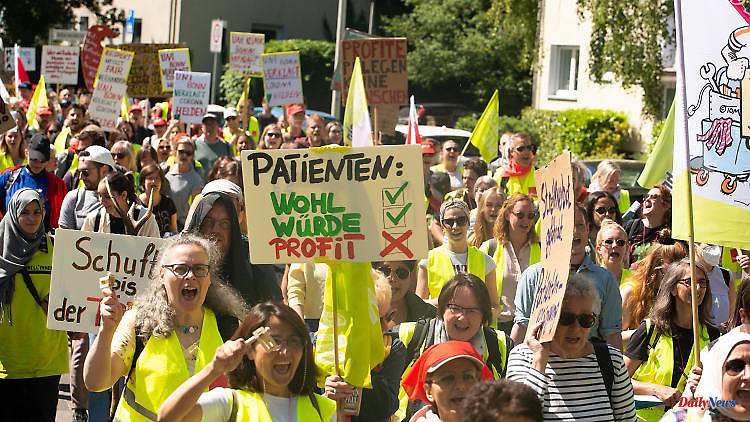For 77 days, the nursing staff at the university clinics in North Rhine-Westphalia fought for more relief. With success: You will now be compensated if you have to take care of too many patients. The case of a nurse at the Berlin Charité shows how this works.
It's a good day for Sophie Radke at the children's cancer ward of the Berlin Charité. Together with four other nurses, a teacher and a service worker, she has to take care of the 14 little patients today. A good cut. There is also time to talk to the sick children and their parents.
But not every day is like this: Sometimes colleagues are absent or unplanned emergencies arise. Then what is human is lost, says Sophie. That still gnaws at her after the shift. She then often has the feeling that she cannot talk to the patients for whom she is so important. "I don't want them to think I don't care about them," says the trained health and pediatric nurse. Then there would be stress and the dissatisfaction of not having done justice to the patient.
Such stressful situations have been systematically recorded at the Charité since the beginning of the year. Sophie goes to the computer and logs on. A page opens. It says "CHEP Balance" and "CHEP Purchased: 10". CHEP - that stands for "Charité relief points". The nursing staff get a relief point if they have looked after too many patients in five shifts. So Sophie has already worked 50 heavy shifts this year.
The Berlin hospital was thus a role model for university hospitals in North Rhine-Westphalia. A 77-day strike has just ended there - one of the longest in the history of the hospital. The nurses there also fought for the right to collect relief points.
When a load occurs varies from station to station. In the intensive care unit, one nurse per shift should not look after more than 1.8 patients. In the adult ward, it becomes too much when one nurse has to look after more than ten patients on the early and late shift and more than 15 on the night shift.
Carla Eysel is a member of the Charité board and responsible for staff and care. With the introduction of the CHEP system, there was an objective measurement of exposure for the first time. It's high, says Eysel. But it is good that there is finally transparency. Staff gaps would also become clear now. "We think that we need around 180 additional nurses a year in order to get the right occupation in the sense of the collective agreement," says Eysel.
In the long run, such a relief could lead to more nurses being recruited: if the job becomes more attractive, more young people might decide to train as health and nurses, it is hoped. In addition, caregivers who have dropped out may decide to return to the job or go back to part-time work. A study by the Hans Böckler Foundation, which is close to the SPD, calculated a potential of at least 300,000 full-time jobs through job returnees and part-time top-ups.
Pediatric nurse Sophie Radke can now redeem her relief points and decide whether she wants to have free time, a payment or, for example, a holiday allowance of 156 euros. The Charité is also working on the possibility of saving credit points for sabbaticals. Sophie's head of nursing, Kevin Bartsch - also responsible for the duty rosters in children's oncology - says that some colleagues used the free time they had acquired for further training. Sophie has redeemed 5 relief points so far and will soon have a few days off - she doesn't know exactly what she'll do then. Maybe going away for a long weekend, she says and smiles.












